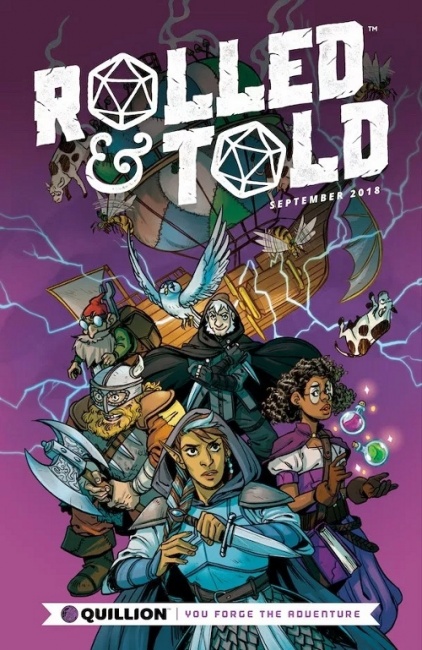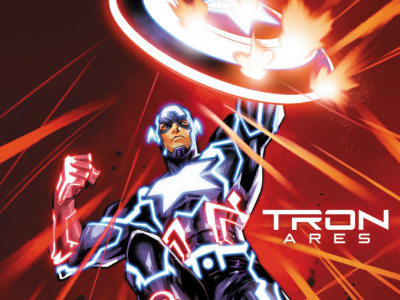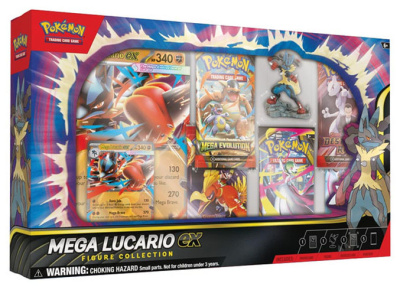Lion Forge recently announced a new hybrid comic-game periodical, Rolled and Told as the first title under the company’s new game imprint, Quillion ("Lion Forge Plans Hybrid Comic-Gaming Imprint"). We caught up with Lion Forge President Geoff Gerber at San Diego Comic-Con to find out more about the company’s plans for games.
ICv2: Tell us more about what you're going to do in the future issues of Rolled & Told.
Geoff Gerber: It's an effort to bring storytelling that we do through comics to interactive gameplay through roleplaying games. The periodical is to support Open Game License roleplaying games and create accessibility to roleplaying games for novice or casual gamers who aren't necessarily going to be running a regular campaign.
Once a month, we'll be dropping an issue that has two adventures in it, including a main adventure that's designed for four to six hours of roleplaying game.
That's OGL, right?
It's OGL. In our first year, it'll all be Dungeons & Dragons 5th Edition. The adventure is an out‑of‑the‑box adventure that you can play.
We've got four iconic characters that we use to help people identify. If they don't have their own characters for whatever level that adventure is, they can download the characters from the website and go ahead and play them, or they can go ahead and make their own characters and play them.
Each issue will also have a mini-adventure for two to three hours of play. The idea being that once a month, you're going to get a couple of games. Maybe you'll have a longer gameplay that you can do, or maybe you'll have a shorter gameplay, and there'll always be something you can do.
We'll also have at least three features in each periodical. The features will rotate between things like articles about how to be a better GM, or how to integrate house rules into your gameplay. I believe in February, we're going to have an article about romance in roleplaying games for Valentine's Day.
Features will include new monsters that you can use in your campaign, or we might have a random generation feature that will help you rapidly build up a situation. If you walk into a library, and your adventurers are asking you all kinds of questions, you can roll up answers to those questions quickly.
The goal is that it will take some of the challenges of learning how to play roleplaying games away, and make it an accessible entry point for casual gamers that don't necessarily have a regular group every week, for four to six hours.
Because of our background as a comic book publisher, it's important that we're bridging comics and gameplay in this, so every issue will have a two‑page comic story involving our iconic characters and their adventures in the adventure that's in the book.
Characters from your comic line?
Not from our comic line. We created new characters for the periodical so that you can revisit them, or you can play them. They'll be downloadable from the website.
Then we're not trying to compete with the fantastic fantasy art that Dungeons & Dragons or that Pathfinder is doing with their roleplaying games. All of the art that we put in here is done by comic book artists. We have fabulous maps that are generated by comic book artists. The splash art illustration here is generated by various comic book artists. We're going to be rotating through just a great list of contributors.
When are you going to start actually producing standalone games?
Standalone games, we'll be rolling those out in 2019. We've got a number that are in development. I think as a publisher, most of our tabletop games are going to start off as book‑based tabletop games.
RPGs, basically?
RPGs, but also lighter RPGs. Following up on our mission, and being a company that does "comics for everyone," we want to be games for everyone. Our tabletop gaming imprint will really be focusing on games for eight and up, bringing tabletop gaming and RPG gaming more accessibly to younger audiences.
A lot of the things that we're doing will be a little bit hybrid of roleplaying games and simpler tabletop games that younger kids are familiar with, to transition them into full roleplaying games.
All for younger players, primarily?
The idea being that there'll be appeal for older ages, but typically, roleplaying games seem to kick in 10, 11, 12. It's really the tweens and up is when they start to play. The rules can get complicated, but the skills involved in interactive social gameplay are crucial life skills about pragmatic language, about interacting with peers, learning to develop group norms of behavior, how to resolve conflict.
Then there are simple math skills involved. Teachers and librarians love roleplaying games with students. We want to make sure that we can bring those types of games to a younger audience. Those games for a younger audience can be just as engaging for teens and older adults.
We think that creating some roleplaying games for 8 to 12‑year‑olds provide a lot of opportunity for RPGs to be family game nights.
That's a great concept.
I hope it works. I know there's a demand for it.

ICv2 Interview: Lion Forge President Geoff Gerber
Posted by Milton Griepp on August 3, 2018 @ 3:20 am CT
MORE COMICS
From Marvel Comics
August 22, 2025
This October, Marvel Comics celebrates the release of TRON: Ares with new variant covers.
From Dynamite Entertainment
August 22, 2025
Here's a preview of Sonja Reborn #1, published by Dynamite Entertainment.
MORE NEWS
New Boxed Set
August 22, 2025
The Pokemon Company International will release Pokemon TCG: Mega Lucario ex Figure Collection, a new boxed set, into retail.
Offers Retail Tier
August 22, 2025
Mantic Games' Assassin's Creed: Animus has hit Kickstarter and has a retail rewards tier.









